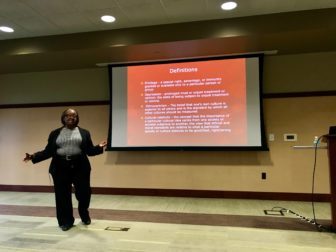
The Delta Township District Library offered an implicit bias identification program as part of Capital Area Reads 2019.
The reading project encourages communities to read and discuss a selected title, then meet the author, according to Thomas Moore, Adult Services Librarian at Delta Township District Library.
The chosen book is “The Hate U Give,” by Angie Thomas. The book was a #1 New York Times Bestseller. It deals with racism and systemic inequality. Moore says, “It is especially important to talk about our own biases while we’re reading this book, and to think about the ideas behind them, to help understand how we are acting in different situations.”
According to Moore, the theme was chosen to educate people so that unconscious biases do not control them in the future.
Trina Rios, an Army veteran and licensed counselor, led the program. Her main goal is to enlighten others and make people aware.
Rios says, “Implicit bias refers to the attitudes or stereotypes that affect our understanding, our actions and decisions in an unconscious manner. Implicit bias is not something you think about. It is not deliberate racism. It is something that is innate, as in looking at something and making an assumption based on your personal experiences.”
The program educated participants on how diverse the Lansing School District is. Fourteen percent of district students do not speak English. Most attend PEACE schools in Lansing. The PEACE Initiative stands for Promoting Peace by Expanding Awareness of Culture and Equity. Most of Lansing’s refugees attend these schools, which provide them with various learning services. In PEACE communities, nearly half of children live in poverty.
There are more than 54 native languages representing 70 countries spoken in Lansing schools alone. Rios said, “We live on one world, one earth, and it is getting smaller every day.”
She included these statistics in her presentation because students are the future adults in Lansing. She says that while Lansing embraces a rich cultural reality, language barriers exacerbate social, emotional, discipline and learning challenges and often result in violent encounters between Lansing natives and refugee families.
Rios raised the example of bias-based policing to explain how implicit biases affect people. Bias-based policing is when an officer makes decisions or takes action based upon their own personal or societal biases, rather than relying on facts and observations. This can lead the officer to believe that a person has been, is, or is about to be involved in criminal activity.
Rios said she does not distrust all cops, but bias-based policing means she could encounter that bad cop, so she is concerned not only for herself, but for her kids.
“As a mother of black boys, I have to train them how to react when you get stopped by the police. And, it’s not saying, ‘officer why did you stop me?’ It’s having your hands in plain view, and not saying anything until they talk to you. And then, answering them with a ‘yes, sir’ and a ‘no, sir,’ because it could literally cost you your life.”
Marcus Jefferson, president at Michigan Bulletin and collaborator with Rios, has experienced judgments by police. Jefferson says, “One of the things that concerned me is that we don’t interact with enough people of different nationalities to understand them. What happens is we put people in stereotypes. I even do it.”
Bias-based policing truly speaks to implicit bias, according to Rios. It shows that some actions may be OK for a certain group of people, but not for others.
The second half of the program was about different cultures. Rios said, “A lot of people do not understand or appreciate other cultures. We have to be able to embrace the differences in each other. My philosophy is there is one race: the human race. Everybody has the core needs in their life, and that’s what makes us the same. Instead of looking at what is different, we should look for what is the same.”
Rios closed her talk by encouraging listeners to take an online implicit bias test produced by Harvard University. By doing this, participants can discover unconscious associations they may have about race, gender, sexual orientation and other topics.
Rios believes that the initial step in challenging your biases is to look at one’s own beliefs about the culture, looking at any preconceived notions and biases, and not letting these biases be transferred onto others. “The more you are aware of these beliefs, the more you will understand when transference of these beliefs are playing out,” Rios says.